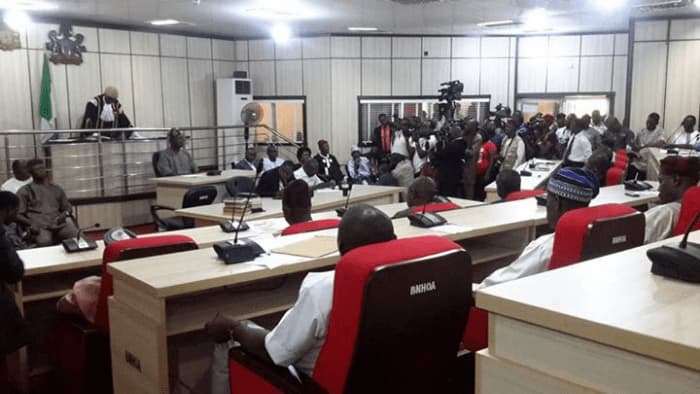The Benue State House of Assembly has intensified its push for enhanced security measures, including community-driven self-defense initiatives and stricter enforcement of the state’s Open Grazing Prohibition and Ranches Establishment Law of 2017, in response to escalating attacks by suspected armed Fulani herdsmen. The resolution, adopted on June 17, 2025, followed a deadly assault in Yelewata, Guma Local Government Area, which claimed numerous lives and displaced residents. The Assembly condemned the incident as a “coordinated invasion, massacre, genocide, and act of terrorism,” urging immediate action to protect vulnerable communities.
The 2017 anti-open grazing law, signed into effect by former Governor Samuel Ortom, bans open grazing across Benue State and mandates ranching as a sustainable alternative to mitigate farmer-herder conflicts. The law establishes guidelines for livestock management, requiring herders to operate within designated ranches and prohibiting the movement of cattle on foot in rural and urban areas. Despite its passage, enforcement has faced challenges, including resistance from groups like the Miyetti Allah Cattle Breeders Association of Nigeria, who argue it infringes on herders’ rights.
The Assembly’s recent motion, moved by Terseer Ugbor, representing Kwande East, highlighted the persistent insecurity despite the law’s existence. Ugbor noted that while the anti-open grazing law had reduced the frequency of attacks since 2017, non-compliance by some herders continues to fuel violence. He cited the Yelewata attack as evidence of the need for communities to adopt vigilante systems, given the perceived failure of security outfits like Anyam Nyor to curb the menace.
Speaker Hyacinth Dajo emphasized the Assembly’s commitment to supporting Governor Hyacinth Alia in fully implementing the grazing law. He clarified that the state has no intention of repealing the legislation, which he described as a critical tool for fostering peace and protecting farmers’ livelihoods. The Assembly also called on security agencies, including the Nigerian Police and Department of State Services, to proactively identify and neutralize threats before they escalate.
In addition to legislative measures, the Assembly declared a three-day mourning period from June 18 to June 20, 2025, to honor victims of the Yelewata massacre and other attacks across the state. During this period, flags are to be flown at half-mast, and public activities are expected to reflect the somber mood. The gesture underscores the gravity of the security crisis, which has displaced thousands and destroyed farmlands in Guma, Logo, and other local government areas.
The call for self-defense measures has sparked debate among stakeholders. Proponents argue that arming communities or strengthening local vigilante groups could deter attackers, especially in remote areas where security forces are thinly stretched. Critics, however, warn of the risks of proliferation of arms and potential misuse, which could exacerbate conflicts if not properly regulated.
Governor Alia, in response to the Assembly’s resolution, reaffirmed his administration’s commitment to enforcing the anti-open grazing law. His government has initiated dialogues with stakeholders, including traditional rulers and community leaders, to ensure compliance and address grievances. The administration has also promised to equip security agencies with resources to patrol volatile areas more effectively.
The Assembly’s resolution also urged the federal government to deploy additional troops to Benue’s volatile regions, particularly along border communities prone to cross-border incursions. Lawmakers cited intelligence reports suggesting some attacks may involve foreign elements, complicating local security efforts. The federal government has yet to respond to this specific request, though military operations in the North Central region have been ongoing.
Historical data indicates that Benue has borne the brunt of farmer-herder clashes in Nigeria’s Middle Belt, with thousands killed and millions displaced since the early 2000s. The 2017 grazing law was a pioneering effort to address this crisis, inspiring similar legislation in states like Taraba and Ekiti. However, inconsistent enforcement and political opposition have limited its impact, prompting the current push for renewed vigor.
Local communities, particularly in Guma and Makurdi, have expressed support for the Assembly’s stance on self-defense. Community leaders like Chief Joseph Anawa of Yelewata have called for training and legal backing for vigilante groups to complement state efforts. They argue that timely intervention by locals could prevent tragedies like the recent attack, which reportedly lasted hours without security response.
The Assembly’s resolution has also drawn attention to the economic toll of the insecurity. Benue, known as Nigeria’s “food basket,” has seen declining agricultural output due to farmers’ inability to access their lands. The grazing law’s enforcement is seen as critical to restoring confidence among farmers and boosting food security in the state.
Civil society organizations have weighed in, with groups like the Benue Non-Governmental Organization Network urging the government to balance self-defense measures with human rights considerations. They advocate for community policing models that involve trained and accountable personnel rather than unregulated vigilante groups. These organizations also called for psychosocial support for displaced persons and survivors of attacks.
The Assembly’s push aligns with broader regional efforts to address herder-farmer conflicts. Neighboring states like Plateau and Nasarawa have faced similar challenges, prompting calls for a regional security framework. The Middle Belt Forum, a socio-political group, has endorsed Benue’s approach, urging other states to adopt and enforce grazing laws.
As the mourning period begins, the Assembly has tasked its Committee on Security to liaise with the executive arm to monitor compliance with the grazing law and report back within two weeks. The committee is also expected to propose guidelines for integrating self-defense mechanisms into the state’s security architecture. This proactive stance signals a determination to address the crisis head-on, though challenges remain.
The resolution has not addressed compensation for victims, a recurring demand from affected communities. Previous administrations established relief funds, but disbursements have often been marred by allegations of mismanagement. The Assembly may face pressure to include such provisions in future deliberations.




